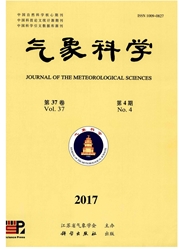

 中文摘要:
中文摘要:
为了探讨暴雨与湿位涡场分布特征之间的关系,利用NCEP 1°×1°间隔6 h的再分析资料,通过计算湿位涡(MPV)的垂直分量(MPV1)和水平分量(MPV2),对华北一次暴雨过程的湿位涡场进行了诊断分析。结果表明:此次暴雨发生在对流层低层等θse线密集带内,降水前对流层低层MPV1〈0、MPV2〉0,暴雨区存在对流不稳定和斜压不稳定;暴雨区位于对流层低层MPV1、MPV2正负过渡带的等值线密集带内,有利于水汽辐合和垂直涡度的加强;主要降水期间,850 h Pa层MPV1起主导作用,MPV1负值增大、MPV2正值减小,降水后期,MPV1〉0、MPV2几乎为0,大气层结接近对流稳定。低层湿位涡中心的时空分布与暴雨的发生和落区有很好的对应关系。
 英文摘要:
英文摘要:
In order to explore the relationship between rainstorm and moist potential vorticity field characteristics, we use NCEP reanalysis data with a resolution of 1°×1°to calculate the vertical component of moist potential vorticity(MPV1) and the horizontal component of moist potential vorticity(MPV2), and conduct a diagnostic analysis of moist potential vorticity for a rainstorm in North China. The results are as follows. The precipitation occurred in the neighborhood of the dense belt of potential pseudo-equivalent temperature isoline in the lower troposphere. The occurrence of MPV1 〈0 and MPV2 〉0 in the lower troposphere before the precipitation starts indicated the existence of convective instability and baroclinic instability. The rainstorm region was located near the dense belt of isoline in the positive and negative transition region of MPV1 and MPV2 in the lower troposphere, where it was favored to converge water vapor and develop vertical vorticity. During the main precipitation period, MPV1 played a leading role and the negative value of MPV1 near the precipitation center increased, while the positive value of MPV2 decreased at 850 h Pa. Toward the end of precipitation period, MPV1 0 and MPV2 almost became zero; thus the atmosphere was close to stable convection stratification. The spatial and temporal distribution characteristics of moist potential vorticity in the lower troposphere had a better correspondence with the occurrence and development of rainstorm.
 同期刊论文项目
同期刊论文项目
 同项目期刊论文
同项目期刊论文
 期刊信息
期刊信息
